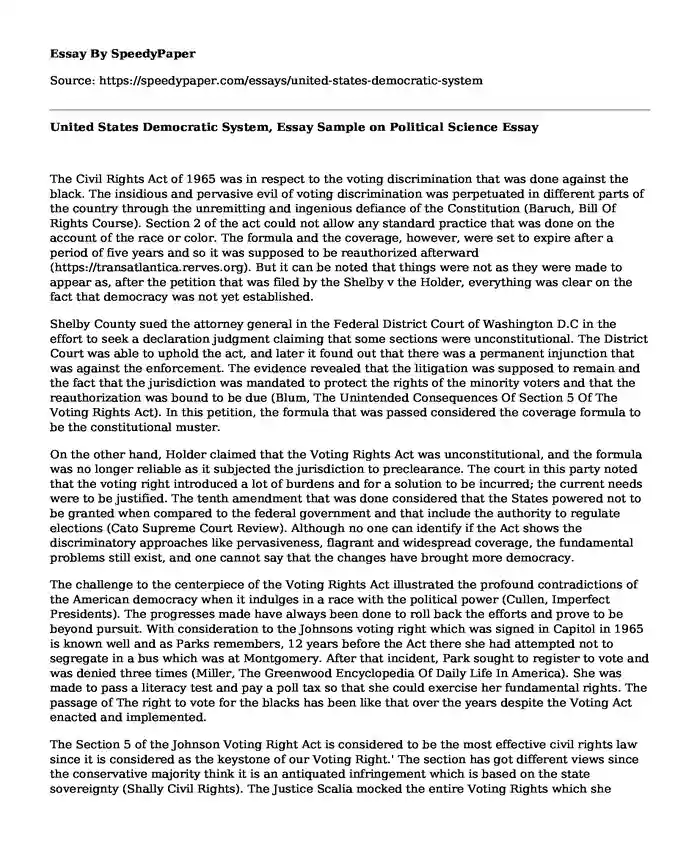
| Type of paper: | Essay |
| Categories: | United States Political science Democracy |
| Pages: | 3 |
| Wordcount: | 787 words |
The Civil Rights Act of 1965 was in respect to the voting discrimination that was done against the black. The insidious and pervasive evil of voting discrimination was perpetuated in different parts of the country through the unremitting and ingenious defiance of the Constitution (Baruch, Bill Of Rights Course). Section 2 of the act could not allow any standard practice that was done on the account of the race or color. The formula and the coverage, however, were set to expire after a period of five years and so it was supposed to be reauthorized afterward (https://transatlantica.rerves.org). But it can be noted that things were not as they were made to appear as, after the petition that was filed by the Shelby v the Holder, everything was clear on the fact that democracy was not yet established.
Shelby County sued the attorney general in the Federal District Court of Washington D.C in the effort to seek a declaration judgment claiming that some sections were unconstitutional. The District Court was able to uphold the act, and later it found out that there was a permanent injunction that was against the enforcement. The evidence revealed that the litigation was supposed to remain and the fact that the jurisdiction was mandated to protect the rights of the minority voters and that the reauthorization was bound to be due (Blum, The Unintended Consequences Of Section 5 Of The Voting Rights Act). In this petition, the formula that was passed considered the coverage formula to be the constitutional muster.
On the other hand, Holder claimed that the Voting Rights Act was unconstitutional, and the formula was no longer reliable as it subjected the jurisdiction to preclearance. The court in this party noted that the voting right introduced a lot of burdens and for a solution to be incurred; the current needs were to be justified. The tenth amendment that was done considered that the States powered not to be granted when compared to the federal government and that include the authority to regulate elections (Cato Supreme Court Review). Although no one can identify if the Act shows the discriminatory approaches like pervasiveness, flagrant and widespread coverage, the fundamental problems still exist, and one cannot say that the changes have brought more democracy.
The challenge to the centerpiece of the Voting Rights Act illustrated the profound contradictions of the American democracy when it indulges in a race with the political power (Cullen, Imperfect Presidents). The progresses made have always been done to roll back the efforts and prove to be beyond pursuit. With consideration to the Johnsons voting right which was signed in Capitol in 1965 is known well and as Parks remembers, 12 years before the Act there she had attempted not to segregate in a bus which was at Montgomery. After that incident, Park sought to register to vote and was denied three times (Miller, The Greenwood Encyclopedia Of Daily Life In America). She was made to pass a literacy test and pay a poll tax so that she could exercise her fundamental rights. The passage of The right to vote for the blacks has been like that over the years despite the Voting Act enacted and implemented.
The Section 5 of the Johnson Voting Right Act is considered to be the most effective civil rights law since it is considered as the keystone of our Voting Right.' The section has got different views since the conservative majority think it is an antiquated infringement which is based on the state sovereignty (Shally Civil Rights). The Justice Scalia mocked the entire Voting Rights which she called it a perpetuation of the racial entitlement in the year 2006.
In a nutshell, the challenges to the section 5 of the Voting Rights Act which was brought about by Shelby County, Alabama and the Johnsons Voting right indicates that there are a lot of technical arguments on the coverage things such as the formulas and the congruence and the proportionality tests. In that context, the Court decision can rely on the atmospheric of the case rather than the arguments. It is, therefore, sufficient to consider that the ruling makes the United States to be less democratic rather than it is supposed to be
Work cited
T.L Brunell. 2015 https://transatlantica.rerves.org.
N.p., 2016. Web. 22 May 2009.
Baruch, Chad. Bill Of Rights Course. Austin, Tex.: State Bar of Texas, 2013. Print.
Blum, Edward. The Unintended Consequences Of Section 5 Of The Voting Rights Act. Washington, D.C.: AEI Press, 2007. Print.
Cato Supreme Court Review 2012-2013. Cato Inst, 2013. Print.
Cullen, Jim. Imperfect Presidents. New York: Palgrave Macmillan, 2007. Print.
Miller, Randall M. The Greenwood Encyclopedia Of Daily Life In America. Westport, Conn.: Greenwood Press, 2009. Print.
Shally-Jensen, Michael. Civil Rights (1954-2015). Print
Cite this page
United States Democratic System, Essay Sample on Political Science. (2019, Sep 24). Retrieved from https://speedypaper.com/essays/united-states-democratic-system
Request Removal
If you are the original author of this essay and no longer wish to have it published on the SpeedyPaper website, please click below to request its removal:
- Music Concert Report Essay Example
- Marketing Innovation - Marketing Essay Example
- Free Essay Example: Leadership-Applying Concepts
- Essay Sample Dedicated to the Effects of Stress in the Workplace
- Essay Sample on Social Media and Business Marketing
- Essay Sample on Application of Lao-Tzu's Concept in Real Life
- Free Essay. Forensic Anthropology- Season 11 Episode 5: Bones: Resurrection in Remains
Popular categories




